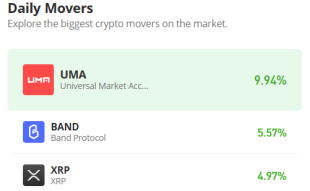Join Our Telegram channel to stay up to date on breaking news coverage
It’s been a rough last two years for Coinbase. After opening up to a price of $381 on the initial IPO in April 2021 near the peak of the crypto market bull market, the stock has corrected as much as 90%. The Bitcoin winter, coupled with a host of negative news, along with an initially over-inflated price, have contributed to this decline.
More recently, the Securities and Exchange Commission (SEC), the main regulatory financial body in the U.S., has brought Coinbase back in the news. This past Wednesday, the SEC warned the company of impeding action due to its staking products business, which allegedly represent unregistered securities. The exchange, as well its wallet, Coinbase Wallet, are being referenced. Most likely in connection with this, Coinbase announced it would discontinue the Algorand (ALGO) staking rewards program for its users.
Discussions with the SEC
Upon given the notice, the company expressed surprise, given that its business has been going on for years without any previous issue. Coinbase also has a history of cooperating with the SEC on regulatory matters. This has been interpreted by many as trying to curry favor with the U.S. regulators.
In July, Coinbase filed a petition asking the SEC for clarity regarding which digital assets would be considered securities, as this has been an ongoing confusion affecting a large sector of the industry. It followed that up on March 20 asking once again for regulation in the area.
SEC’s action against Kraken
In February this year, the SEC filed a complaint against another major cryptocurrency exchange, Kraken. It accussed Kraken of
failing to register the offer and sale of their crypto asset staking-as-a-service program, whereby investors transfer crypto assets to Kraken for staking in exchange for advertised annual investment returns of as much as 21 percent
Kraken reached a settlement with the SEC, by announcing it would immediately discontinue its staking programs and pay $30 million in “disgorgement, prejudgment interest, and civil penalties”.
More recently, Kraken was again in the news for suspending ACH deposits and withdrawals due to the failure of its crypto-exchange banking partner, Silvergate Bank.
What is staking
Decentralized blockchains maintain their security and reliability through various means, the main ones being proof-of-work (like Bitcoin) or proof-of-stake, in which assets are being pledged as collateral by the network’s validator nodes. In return, they receive tokens as rewards, which generates yields for investors. Like Kraken, Coinbase has offering its consumers the opportunity to participate in staking through a Staking-as-a-Service program.
Coinbase legal offier Paul Grewal expressed surprise at Kraken’s settlement with the SEC and closure of its staking business. He wrote that:
Until this settlement, the Commission had not conveyed that it might consider staking services to constitute an investment contract and therefore a securities offering requiring registration with the SEC. And the SEC had not previously made this position known despite ample opportunity to engage the crypto industry and its participants with its concerns.
Grewal also wrote on his blog that the SEC did not give enough information regarding how to respond to their notice. He also writes that “The SEC staff told us they have identified potential violations of securities law, but little more.” At the same time, he tweets that
Over the past 9 months, Coinbase has met with the SEC more than 30 times, sharing details of our business to build a path to registration. During this time, the SEC hasn’t given any feedback on what to change, or how to register. Instead, today we received a Wells notice.
Brian Armstrong, Coinbase’s CEO, wrote on Twitter that there has been previously no sign from the SEC that staking may be against the law, and that in fact when Coinbase went public, there were a lot of mentions of staking in its S-1 form:
3/ While we understand that this is all part of the journey to reforming our financial system, we are right on the law, confident in the facts, and welcome the opportunity for Coinbase (and by extension the broader crypto community) to get before a court.
— Brian Armstrong (@brian_armstrong) March 22, 2023
Reaction of Crypto Community
Echoing Brian Armstrong’s sentiment, others such as Caitlin Long, CEO of Custodia Bank, expressed surprised that the SEC has allowed Coinbase and others to offer staking rewards for years and to suddenly change course. She takes that as a sign that the current U.S. administration is bent on attacking all crypto and driving it out of the country.
IT SHOULD BE CRYSTAL CLEAR BY NOW that the Biden Administration wants all #crypto (even the legit parts of it)–run out of the U.S. See also yesterday's White House economic report, which dunked on all financial innovation while espousing the "stability" of traditional banks https://t.co/eFZsKpZG15
— Caitlin Long 🔑⚡️🟠 (@CaitlinLong_) March 22, 2023
Operation Choke Point 2.0? Other players recently targeted by the SEC
In what some term “Operation Choke Point 2.0“, SEC has been going aggressively after several crypto players recently.
In February, the SEC issued Paxos a Wells Notice for its participation in establishing and overseeing the reserves for Binance USD (BUSD), a stablecoin tied to the U.S. dollar. Despite having stated that it “categorically disagrees” with the SEC’s accusations, the company ended its partnership with Binance and ceased issuing BUSD. Customers were guaranteed by Paxos that all BUSD issued by Paxos would be redeemable through February 2024 and would continue to be fully backed.
After the United States sanctioned Tornado Cash, an Ethereum mixing service, and the wallets that used it in August of last year, Coinbase CEO Brian Armstrong declared that if regulators threatened him, he would sooner shut down Coinbase staking than censor transactions.
The SEC also filed a lawsuit against Justin Sun, the founder of Tron, and a few other celebrities, including Jake Paul and Lindsay Lohan, for Tron-related violations on the same day as today’s Coinbase letter. The advertising and sale of Tronix (TRX) and BitTorrent (BTT) tokens, which it referred to in a press release as unregistered “crypto asset securities,” have drawn criticism from the SEC.
In a move that foreshadows what’s to come ahead, the Division of Enforcement’s Crypto Assets and Cyber Unit of the SEC intends to expand from 30 white-collar regulatory officers to approximately 50 specialized jobs. Investigating, auditing, evaluating, and perhaps prosecuting securities law infractions relating to cryptocurrency-related items and trading activities will be the responsibility of the new hires.
Investments outside of the United States
Bloomberg reported recently that Coinbase is looking aggressively scale its international presence, and this is likely due the current crypto-unfriendly regulatory climate in the U.S.
According to a global crypto benchmarking study, the cryptocurrency industry employs roughly 2,000 workers full-time. When compared to the U.S. banking behemoths that are too big to fail, including JPMorgan, Wells Fargo, and Bank of America, the amount is negligible, but the cryptocurrency business is still very young in comparison to the traditional banks.
These companies can grow quickly, especially now when people are hesitant to leave their money in banks. It’s crucial to create new jobs in a difficult economic environment through innovative enterprises that could one day employ tens of thousands to hundreds of thousands of people in and around this emerging industry.
If Coinbase decides to create a beachhead abroad, it would be able to reach new markets and draw in new customers. The potential launch of a new trading platform may diversify its revenue streams while also easing regulatory tensions in the United States.
Related
- US SEC allegedly notified Paxos of an upcoming lawsuit tied to Binance USD (BUSD)
- Operation Choke Point 2.0: US goes after crypto amid confusion and uncertainty
- Coinbase Suspends Algorand Staking Rewards
Join Our Telegram channel to stay up to date on breaking news coverage


